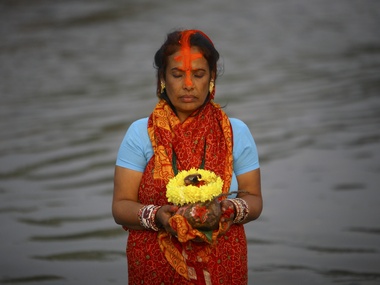The next time a government form asks you fill in your religion, you need not say Hindu, Muslim, Parsi, Buddhist, Jain, Sikh or Christian. As in EVM machines, there is now an effective NOTA (none of the above) option, thanks to a Bombay High Court directive. [caption id=“attachment_1728811” align=“alignleft” width=“380”]  Representational image. Reuters[/caption] The High Court has directed the Union and state governments “not to compel anyone to declare or specify his religion in any form or any declaration.” One would have thought this was elementary logic, given that our constitution guarantees all citizens the right to his form of worship. Implicit in this guarantee is the right to not believe in any religion at all. The court said: “There is no law which compels a citizen or any individual to have a religion. The right of freedom of conscience conferred on a citizen includes a right to openly say that he does not believe in any religion and, therefore, he does not want to practice, profess or propagate any religion,” The Times of India reports. However, the court directive has logical consequences since the Indian state has built its entire administrative structure by slotting people into this category or the other. And the categories go beyond religion to caste and even tribal identities. The simple follow-up question to ask is: if you can’t be compelled to state your religion, what is the logic of asking people to state their caste or tribal identities? That too would be ultra vires of the spirit of the constitution, if not its letter. Our constitution makes specific provisions for the uplift of the scheduled castes and tribes, but it does not follow that you have to declare you caste – unless it is to benefit from an uplift programme. The logical culmination of the court’s observation is a non-identity based citizenship. Benefits and quotas should thus be based on socio-economic categorisation and not based on government-imposed narrow identities. A related issue crops up from the specifics of the case heard by the high court: what constitutes a religion, and who can be said to belong to it? Is it about which specific god you believe in or is it merely a matter of self-declaration? What links a particular god to a particular religion, and can we have religion without god? The public interest case was filed by three individuals - Ranjeet Mohite, Kishore Nazare and Subhash Ranaware - who claimed to belong to a 4,000-member organisation called Full Gospel Church of God, which prima facie sounds Christian. But the three said they believed in Jesus Christ but not Christianity as a religion. The court judgment seemed to leave religion as a matter for self-declaration and not general perception. This is, of course, right for the state cannot force-fit any citizen into a category or denomination he does not see himself belonging to. But self-declaration also means we will not only have hyphenated double-categories of religious identities, but newer categories. Thus we will not only have Shia Muslims or Sunni Muslims or Bahais and Ahmaddiyas, but new categories categories we can’t even currently conceive of: what if someone says he believes in Allah but not his last prophet? Will he be allowed to call himself a Muslim or will he be slotted into a new category - Allah believer, but not Mohammed? Some time back, even the Ramakrishna Mission wanted to be declared a non-Hindu sect, but the Supreme Court decided that could not be the case given Swami Vivekananda’s strong espousal of Hinduism. But the high court’s order in the Full Gospel Church of God case has allowed precisely this: self-categorisation by an organisation of believers. Then there is the possible category of god without religion. What if you believe in an god but not any specific god or religion? The petitioners came to close to this category by labelling themselves believers in Jesus but not Christianity. Clearly you can believe in god or prophet without belonging to a religion. Once we accept self-categorisation as the right thing to do, two other things follow: one, the government has to move away from such categorisations for official purposes, whether it is for doling out sectarian benefits or for census religious headcounts; and, two, those who are incapable of self-declarations - the mentally challenged and non-adults come to mind - should not be included in religious headcounts. They should be categorised as undeclared or under guardianship of someone who The Bombay high court order makes an elliptical reference to kids thus: “If the parents of a citizen practice any particular religion, he has a freedom of conscience to say that he will not practice any religion,” the judges said. The presumption in this part of the court’s observation is that the citizen is an adult, but what if he is under-18? Can he be counted as Hindu, or Muslim or Christian or even Parsi? When you can’t vote below the age of 18, when you get treated differently even if you commit a crime below that age, it means you are not fit to decide many things. So how can you decide which religion you belong to – except as a matter of convenience? Maybe it is time for the government to stop counting minors as part of any religion till they are 18 and affirm the same. Or otherwise. The most sensible thing to do is to stop counting religious, caste and tribal identities. We need to shift to categories based on neutral categories like socio-economic status, incomes, and backwardness of various kinds.
The high court has said that no one can be compelled to state a religion if he does not believe he belongs to one. However, the court’s logic means at some point your caste or tribal identity can be a matter of self-declaration
Advertisement
End of Article
Written by R Jagannathan
R Jagannathan is the Editor-in-Chief of Firstpost. see more


)

)
)
)
)
)
)
)
)



